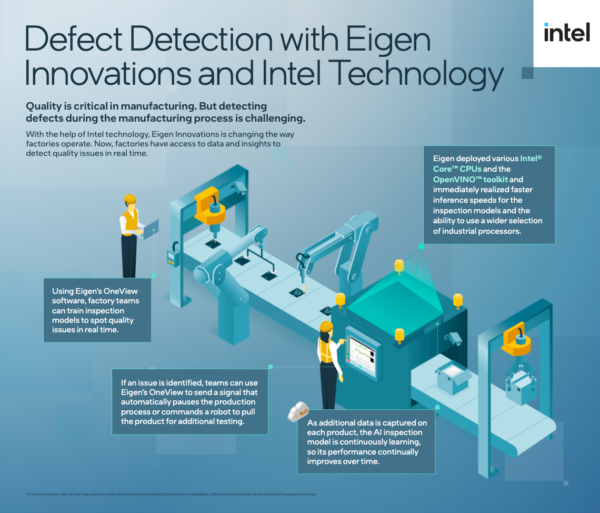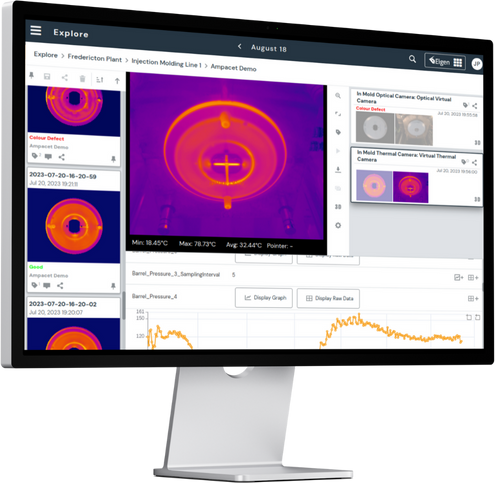In a previous blog – “Go Thermal” For Inline Inspections – we discussed why we believe more manufacturers should consider thermal imaging for inline quality inspections. Thermal quality inspections involve using infrared cameras to detect heat patterns in products and machinery. These inspections are critical in identifying defects such as:
- Overheating components
- Improper heat distribution
- Hidden flaws that may not be visible to the naked eye
Industries like automotive, aerospace and CPG, where precision and reliability are crucial, particularly benefit from these inspections.
Traditional Methods vs. AI-Enhanced Inspections
Traditionally, thermal inspections require skilled technicians to interpret thermal images. This manual approach has several limitations:
- Subjectivity: Results can vary based on the technician’s experience.
- Time-Consuming: Analyzing each image manually takes significant time.
- Human Error: The potential for oversight is high, especially with complex patterns.
Adding AI to thermal inspections helps manufacturers overcome these challenges to automate, refine and standardize inspection processes.
How AI Enhances Thermal Inspections
- Automated Image Analysis: AI algorithms can analyze thermal images with remarkable speed and precision. Machine learning models, trained on datasets of thermal images, can detect anomalies that may go unnoticed by human inspectors. This automation ensures consistent and objective assessments.
- Real-Time Monitoring: AI-powered systems can provide real-time monitoring and instant feedback. This immediate analysis allows for quick corrective actions, ensuring that defective products do not move further along the production line. Eigen delivers real-time monitoring through our OneView software running on touchscreen monitors installed on or near the machines making the products.
- Predictive Maintenance: AI can predict potential failures before they occur by analyzing thermal patterns over time. This predictive maintenance capability helps to schedule timely maintenance, thus preventing costly downtimes and extending the lifespan of equipment.
- Data-Driven Insights: AI can aggregate and analyze data from numerous inspections, offering insights into recurring issues and process inefficiencies. Manufacturers can use these insights to implement process improvements, enhancing overall product quality.
Implementation Strategies

Eigen’s thermal inspection solutions are designed to integrate with existing processes and machines. Our OneView software features image processing and automated data consolidation, allowing manufacturing teams to automate inspections.
Integrating AI into thermal quality inspections involves several key steps:
- System Integration: The AI system needs to be fully integrated with existing thermal imaging equipment and manufacturing workflows. This integration should be seamless to minimize disruptions.
- Data Collection and Annotation: Collecting a comprehensive dataset of thermal images is the first step. These images must be annotated with information about defects and normal patterns to train the AI model effectively. Our solutions also capture process and other sensor data consolidated in standardized digital part records. These records make inspection model training.
- Model Training and Validation: Machine learning models are trained using the annotated data. These models are rigorously tested and validated to identify defects.
- Continuous Improvement: AI models must be continuously updated with new data to maintain accuracy and adapt to new defect types. Easy-to-use tools allow team members to apply labels, review records and update production inspection models on one or across in minutes.
The OneView Advantage
Thermal inspection solutions designed and managed with our OneView software provide several advantages.
- Copy/Paste Configuration: Data flows from the thermal camera(s), machines and other sensors are created with our builder tool. The original configuration then serves as a blueprint making subsequent installations faster.
- Automated Data Processing: OneView has novel image and data processing that generates ONE comprehensive digital record of each product. Labelling standardized images means models can be trained with smaller datasets.
- Standardized Inspection: In cases where our inspection solutions are deployed on multiple machines or lines, one inspection model can be deployed across all machines. In many cases, an existing model can be immediately deployed on a new installation with little or no additional data required.
- Micro/Macro Analytics & Insights: Inspection records can be analyzed to pinpoint defect trends linked to process variation on one machine or across machines. Machine-level insights can help the team identify slight process changes that can allow them to avoid defects. Pan-machine or pan-factory insights can provide corporate Production & Quality teams with the data to optimize processes to avoid defects and create more consistent parts and products.
Future Proof Quality Inspection Solutions

OneView automatically consolidates and enhances images from multiple thermal cameras to generate a standardized inspection view of the entire weld area on plastic tanks.
Integrating AI into thermal quality inspections represents a significant leap forward for manufacturing. It can make previously impossible inline inspections possible. By automating and enhancing the inspection process, AI improves accuracy and efficiency and provides valuable predictive insights that help maintain quality standards. As AI technology evolves, its impact on thermal inspections and overall manufacturing quality will only grow, paving the way for smarter, more reliable production processes. Our thermal solutions provide the perfect foundation for introducing thermal inspections that can evolve with technological advancements that will meet the changing needs of our customers.
Embracing AI in thermal quality inspections is not just a trend; it’s a strategic move toward a more efficient, accurate, and competitive manufacturing future.

